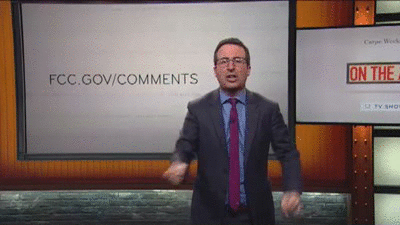N et Neutrality Could Still Be Crushed

Since our business centers around online marketing, everyone here at Zbra Studios stood up and cheered when we read the FCC’s proposal to start regulating internet providers under Title II. The details may be dry, but it’s an unambiguous victory for Net Neutrality.
Classifying the internet under Title II means the government would view access to the internet as a utility, like water or electricity. A necessity not a luxury. Private companies that operate utilities have to submit to greater scrutiny.
After the announcement, the tech world was abuzz about the news. But in the following days the excitement has waned as new stories fill up the headlines. With few exceptions, the world has moved on. Totally natural. Extremely problematic.
What we and tech news circles were hyperventilating over was a proposal. Yes, that proposal went further than anything those of us pining for net neutrality thought was likely, but still only a proposal. Nothing becomes reality unless the 2 of the 4 FCC Commissioners join the Chairmen and vote in the proposal’s favor on Feb. 26th.
There are three key dangers to be aware of in the march toward net neutrality:
The proposal can change
Nothing stops Mr. Wheeler from fiddling with the details or doing a complete about-face before the official vote. The FCC Chairman is going to be receiving a wave of feedback from big cable companies between now and the vote. Given how much public attention has been directed to net neutrality, this strategy would likely result in public backlash, but internet providers probably don’t care. It’s not like we can cancel our internet contracts in protest (which is exactly why it should be treated as a utility).
The vote can be influenced
Mr. Wheeler is one of five people who’ll cast a vote. Two of those votes usually side with the Chairmen. The other two tend to oppose him. Support for this bill isn’t assured and the right political pressure, finessed by the resources of companies like AT&T or Comcast, are more than enough to sway a single vote in opposition. For those of you who aren’t doing the math, one vote is all it would take to scuttle the proposal.
On the other hand, giant corporate interests don’t have to be the only ones with a say in how this plays out. Add your voice to the mix. If you emailed the FCC back in 2014 after John Oliver’s rallying cry, do it again. Hold his nasally British pleas for action clearly in your mind and let those emails fly.
The Chairmen chooses how he enforces the rules after the fact
By proposing to reclassify the internet as a Title II utility, the Chairmen is giving himself the broadest set of tools to regulate internet providers. But he doesn’t have to use every tool he has at his disposal. The FCC has already laid out elements of Title II regulation they won’t use. Price controls and infrastructure sharing are two characteristics of regulation utilities like gas and power companies have to abide by, but Mr. Wheeler has decided both tools are unnecessary to encourage a free and open Internet.
It would be just as easy for him, or his successor, to change their mind about enforcing other elements of the plan. Perhaps later, when the public is focused on the presidential election, Mr. Wheeler could be convinced to be a little less “heavy handed” with his newly minted authority.
If you’re a supporter of Net Neutrality, we’re not done yet. Put the champagne back on ice and jump back into the fray. Tumblr has come up with a fast and effective strategy doing exactly that. Instead of emailing the FCC, contact your congressional representative. They’ve made it supremely easy and argue a great case for why this is the best tactic to keep the pressure on.
You do support Net neutrality, don’t you? If not, you should read this and this which go into far more detail about why this is an issue critical and how we arrived at this critical juncture.


